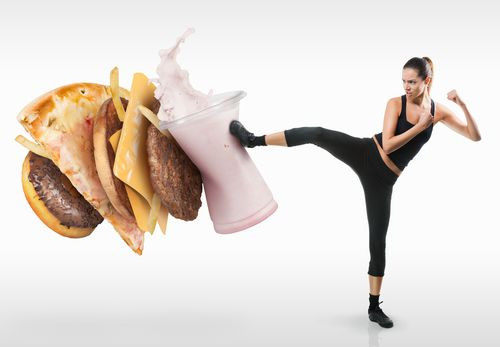Eat This, Not That: 5 Healthier Substitutes For Unhealthy Food Cravings

Food cravings can seem strong enough to pick us up and send us straight to the refrigerator or local grocery, going against our better judgment. Our hunger pangs can often lead us astray, forcing us to make unhealthy choices when it comes to satisfying our food cravings. While we may blame our sweet tooth or stress for these compulsive cravings like chocolate, or a bag of chips, our body may be longing for something we cannot buy at the grocery store. These intense cravings may be a signal that something is amiss in our bodies such as vitamins, minerals, and other nutrients we lack.
Since most of us in the U.S. follow the Standard American Diet — processed foods, and not enough whole, nutrient-rich foods — we suffer from a milder malnutrition. This explains why we end up craving what our body is currently lacking. For example, our body may know it’s missing a certain protein, but since we are not consciously aware of this taste, we begin to feel hunger for foods that we associate with the particular nutrient.
To wrap ourselves around healthier food choices, it’s important to recognize what types of key nutrients we’re missing, and how to put ourselves back on a healthier diet where we remain just as satisfied.
1. Swap Chocolate With Raw Nuts
Craving chocolate means our body is in need of magnesium. Elizabeth Brown, The Kitchen Vixen, Registered Dietitian & Certified Holistic Chef, shared with Medical Daily chocolate provides up to 10 percent DV for 2 ounces and a whopping 290 calories, making it an excellent source of magnesium. She believes our craving for chocolate is perhaps, “a learned response as opposed to the body actually thinking it’s getting the best source of magnesium.” Brown recommends her clients eat nuts on a regular basis to make the craving go away gradually.
While Brown’s suggestion is a good alternative, you don’t always have to count chocolate out. Brandon Mentore, strength and conditioning coach, sports nutritionist, and functional medicine practitioner, told Medical Daily, “Dark chocolate (70 percent or better), that is organic and natural, can provide you with healthy fats, nutrients, being healthy for the brain, and the uterus.”
2. Swap Coffee Or Tea With Hydrating Juice
The desire for coffee or tea is quite common, especially during the early hours of the morning. In the AM, after the body has been on an eight-hour fast of anything liquid or solid, we tend to be more dehydrated. This is due to our metabolic processes still running, and water being lost in the processes.
Brown recommends starting the day with a hydrating juice such as watermelon juice, or diluted orange juice (half water and half OJ). “Once you hydrate your cells you may find you don’t need caffeine boost which actually only exacerbates the situation,” she said. Brown’s morning pick-me-up is sliced grapefruit in the morning for hydration, vitamin C, and fiber — all key for bowel function.
3. Swap Alcohol With Protein
Cravings for alcohol and drugs are typically caused by a chemical dependency the body develops after the consumption of these particular items. Since alcohol causes a chemical imbalance in the brain, involving dopamine and serotonin, it’s best to seek dopamine-enhancing foods. Bananas and sunflower seeds, according to the HealthGuidance.org, are effective in raising dopamine levels.
In addition, to mediate the neurotransmitters in the brain that impact mood, sleep, and digestion, consuming baked, grilled or broiled chicken seasoned with pepper, herbs, and spices is an excellent source of protein. Fish, along with dairy products made with low-fat milk are also good sources. It’s best to stay away from fatty red meats because they may caught high cholesterol and blood pressure problems, according to the University of Maryland Medical Center.
4. Swap Potato Chips With Bananas
Craving salty foods like potato chips suggests the body needs potassium in its system. Salty foods are high in another cation, sodium, and have their appeal in sodium and potassium. In our mind, these foods quench our salty foods’ high sodium content, according to Nature Works Best Cancer Clinic. Our craving for salty foods suggest the body needs more chloride, which can be obtained by consuming raw goat milk, fish, and unrefined sea salt.
5. Premenstrual Cravings
A week before a woman’s menstrual cycle, she tends to crave random foods usually like chocolate, and those laden with saturated fats. These cravings hint that the body needs more zinc. Rene Ficek, a registered dietician, and lead nutrition expert at Seattle Sutton's Healthy Eating, told Medical Daily, “The level of zinc in your system fluctuates depending on your estrogen levels. Therefore, zinc increases as estrogen rises, leading up to ovulation, and then drops right before ovulation and stays lower until the beginning of your next cycle.”
Zinc deficiency has been linked to increased levels of the circulating hormone leptin, which is responsible for regulating the body’s energy expenditure, fat storage, and appetite. The hormone communicates to the brain when it should feel full and stop eating. Insufficient leptin levels are believed to be the primary cause of food cravings and overeating. Good sources of zinc include red meats, seafood, leafy vegetables, and root vegetables.
Rather than cave to your food cravings, understand what your body really needs, and replace junk food compulsive desires with these healthy substitutes.



























